外研版高中英语必修4《odule 4 Great Scientists Grammar》优质课课件_3
Module4 GreatScientists外研版必修4
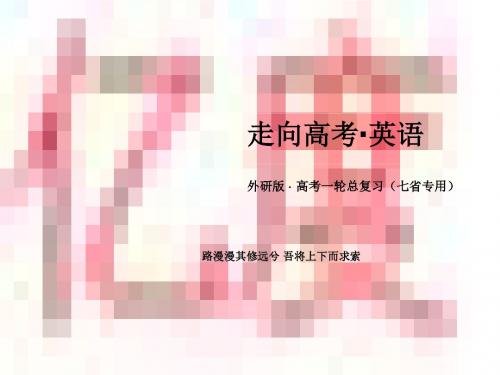
(Ⅳ)教材设问 1.Researchers were ________ from all over China to develop the new system. A.brought up C.put up
答案:B
B.brought in D.put in
2.As ________ result of Yuan Longping's discoveries Chinese rice production rose by 47.5 percent in ________ 1990's. A.the; the C.a; the
典句仿写 根据下面句式仿写句子 ①the key to(doing) sth.做某事的关键;开……的钥匙 仿写:记忆大量的单词是提高你的英语的关键。 ____________________语+doing(作宾语补足语) 仿写: 因为缺少资金的支持(financial support), 我发现很 难使公司正常运行。 _________________________________________________
考题巧解
C 五分之二的表达式方式为:two fifths;谓
语和 land 保持一致。故选 C。
基础回顾
稳扎稳打 网络构建
(Ⅰ)单词速记 A.联想记忆法 1.support vt.& n. 支持→in support ________支持 2.export vt. & n. 出口→________vt. & n.进口 3.brief adj.简短的;简洁的→________brief 简言之 4.quantity n.数量→a large quantity ________大量的 5.escape vi.逃跑;逃避→escape ________从……逃跑 6.clear vi.(烟雾)消散→clear ________消散;散去
外研版高中英语第四册Module4GreatScientists(精)

respect mission
encounter qualified
Use the words in the box to describe the jobs.
badly paid well paid
dangerous exciting
intellectual manual satisfying stressful
interesting boring
Eg: A doctor is satisfying, well paid but stressful. A pilot is dangerous, exciting, satisfying, stressful.
volunteer
volunteer
Look at the six pictures on page 11 and discuss with your partner: Where are they? What do they do? What are they doing?
doctor
She is examining a patient.
Module 2 A Job Worth Doing
沈阳市第四中学
隋悦
accountant
barber
businessman
businesswoman
Cook/chef
electrician
miner
policeman
doctor
lawyer
secretary
Secretary General of the United Nations
Journalist Miner Barber ……
1.
外研版高中英语必修4练习课件:Module 4 Great Scientists
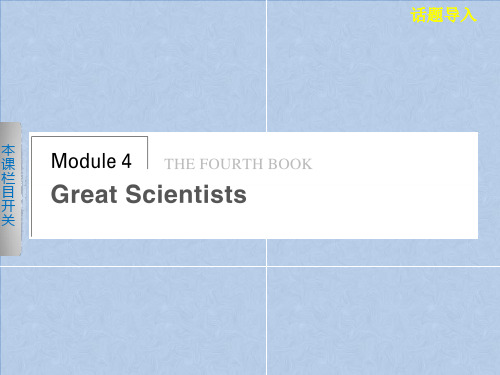
本
塑像;v.认为;估计
课 栏
keep one’s figure保持体形
目
开 figure out弄明白(=make out);计算出(=work out)
关
话题导入
[语境助记2]
(1)He is an important political figure in Indian history. 他是印度历史上一位重要的政治人物。
栏 目
张爱玲是她那个时代最重要的作家之一。
开 关
(2)The army was led by him.
军队由他指挥。
(3)She was in the lead during the race. 她在赛跑中领先。 (4)Heart disease led to his father’s sudden death. 心脏病突发导致了他父亲的猝死。
栏 目
C.the difference between scientists and ordinary people
开 关
D.the difference between carpenters and people with
other jobs
话题导入
4.What’s the best title of the passage?
conditions.
本 B.With the condition changing,the result of the
课
栏 目
observation may also change.
开 C.Condition makes no difference to scientists.
关Hale Waihona Puke D.There’s no point for ordinary people knowing how
外研版高中英语必修四Module 4Great ScientistsReading教案1
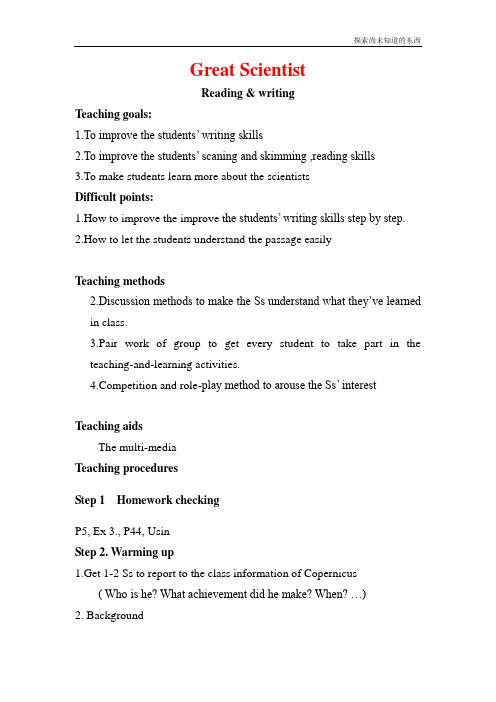
Great ScientistReading & writingTeaching goals:1.To improve the students’ writing skills2.To improve the students’ scaning and skimming ,reading skills3.To make students learn more about the scientistsDifficult points:1.How to improve the improve t he students’ writing skills step by step.2.How to let the students understand the passage easilyTeaching methods2.Discussion methods to make the Ss understand what they’ve learnedin class.3.Pair work of group to get every student to take part in theteaching-and-learning activities.petition and role-play method to arouse the Ss’ interestTeaching aidsThe multi-mediaTeaching proceduresStep 1 Homework checkingP5, Ex 3., P44, UsinStep 2. Warming up1.Get 1-2 Ss to report to the class information of Copernicus( Who is he? What achievement did he make? When? …)2. BackgroundNicolaus Copernicus was a Polish astronomer (1473-1543). Born in Torun, he began his university studies in Krakow in 1491, where he studied canon law and Latin and Greek classics. However he also had an interest in mathematics and astronomy. After obtaining his degree of Doctor of Canon Law (教会法规博士学位)in Italy in 1503, Copernicus returned home to Warmia in Poland to serve as Canon (=priest) .In 1530, Copernicus completed his great work De Revolutionibus (《天体运行论》).Copernicus knew that these findings would lead him into trouble with the Roman Catholic Church (罗马天主教教徒), so he wasin no hurry to publish his theory. He only published it as he lay dying in 1543.Though Copernicus did not live to hear of its extraordinary impact, the book which first suggested that the Sun, not the Earth, is the centre of the universe is now recognized as one of the most influential scientific works of all time.3 Get Ss to give the names of the nine planets of the solar system . Mercury Venus Earth Mars Jupiter Saturn Uranus Neptune PlutoCan you use a good method to memorize them ?M y V ery E asy M ethod: J ust S et U p N ine P lanetsStep 3 Reading ----Copernicus’ Revolutionary Theory (P6-7)1. Fast reading: Listen to the tape, and find out the answers to the questions.1). What did Copernicus think was the center of the solar system?2). When did Copernicus publish his theory?3) Why didn’t C opernicus publish his theory before he died?2. Reading comprehensionP7. e the reading to help you draw the two theories of the universe. Before Copernicus’ theoryA diagram showing the solar system with the earth at its centre Showing Copernicus’ the oryA diagram showing the solar system with the sun at its centerStep 4. Persuasive writing1. Please refer to P8 Learning Tip2. Writing Task: P7. Ex3. (write a short letter asking Copernicus to publish his ideas so everyone can read them)Go over the steps and try to follow them (P7-8)3. Offer a period of time for Ss to write a draft4. Get several Ss to read their writing to the class, T gives some comments5.Give a sample writingOne possible version:Dear Nicolaus Copernicus,I am a student studying astronomy and I would very much like to read your new theory about the solar system. I hope you will publish it for several reasons.I understand the problems with the present theory. The way the planets move is not what you would expect if the earth was the certre of the universe. It is also odd that the brightness of some stars seems to change. So I agree with you that we need a new theory.I know your observations have been very carefully carried out over many years. Now you must have the courage to publish them. Science can never advance unless people have the courage of their beliefs. I know youworry about what will happen if you publish your new theory. No matter how people oppose it, time will show if your ideas are right or wrong.So I hope you will feel you can publish your new theory.Yours sincerely,Zhang HuaStep 5. Homework1 Revise the composition and hand it in tomorrow.。
外研版高中英语必修四 Module 4 Great Scientists课件

高中英语必修四Module 5 Great ScientistsSectionⅠIntroduction, reading and vocabulary一、语言•知识精讲1.Match the words and definitions.把单词和定义搭配起来match v.使较量,使比赛;比得;相配;使比较;使结婚Let beggars match with beggars.龙配龙,凤配凤。
Match your deeds to your beliefs.你应该使你的行动与你的信仰保持一致The king matched his daughter with the duke’s son.国王把女儿嫁给了公爵的儿子。
The carpets should match the wallpaper.地毯应该和墙纸相匹配。
Mary’s skirt matches her shoes.玛丽的裙子和鞋子很相配。
【相关链接】辨析:fit, match, suitfit与suit均指衣服“合适“或”适合“。
而fit指大小、尺寸合体,suit指颜色、花样或款式适合match多指大小、色调、形状、性质等方面的搭配。
The colour of the cloth suits a woman at my wife’s age.这布的颜色适合我妻子那个年龄的妇女That jacket fits well.那件夹克很合身The People’s Great Hall and the Historical Museum match the Tian’anmen magnificently.人民大会堂和历史博物馆把天安门映衬得极为宏伟。
例题1(1)None of us can him in playing tennis.A. matchB. beatC. defeatD. win(2)I guess no one ever up to him. I still think of him.A. wentB. matchedC. caughtD. measured(3)You should your products the market, which is the correct way to earn money.A. suit; toB. add up; toC. subject; toD. ask; to2.When did he discover it?他是什么时候发现它的?discover vi. & vt.发现,发觉discover后可接名词、代词、带疑问词的不定式或that/wh-从句作宾语,也可接以动词不定式、现在分词或“to be + n. / adj. / prep. phrase“充当补足语的复合宾语,可用于被动结构。
外研版英语必修四Module 4 Great Scientists Reading (共18张PPT)
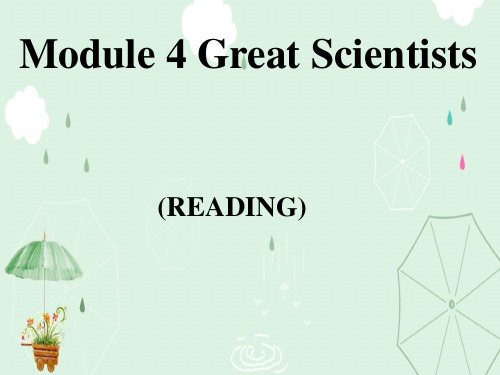
C. are turn to
Class work
√ 1. A staple food is one you eat .
(a) rareቤተ መጻሕፍቲ ባይዱy
(b) regularly
2. A yield refers to .
√(a) quantity (e g of food )
(b) quality (e g of food)
_F_r_o_m__a_n_e_a_r_ly__a_g_e He was interested in plants.
In college ___A_s_a__y_o_u_n_g__
_t_e_a_ch__er____
He studied _a_g_r_i_c_u_lt_u_r_e_. He began experiments in crop breeding.
Hints(提示) The Chinese scientist, Yuan Longping, is … He was … in China. As a boy he was … As a college student ... And as a young teacher ... He thought that the key … In 1966, … In 1970, … His research was … by the government. As a result of … by 47.5 percent in the 1990’s. Yuan Longping’s rice was … to …
A. Para 1. B. Para 2. D. Para 4. E. Para 5.
C.Para3. F.Para6.
Read the text carefully and complete the following chart.
高一英语外研版-必修4-module-4-great-scientists-教案
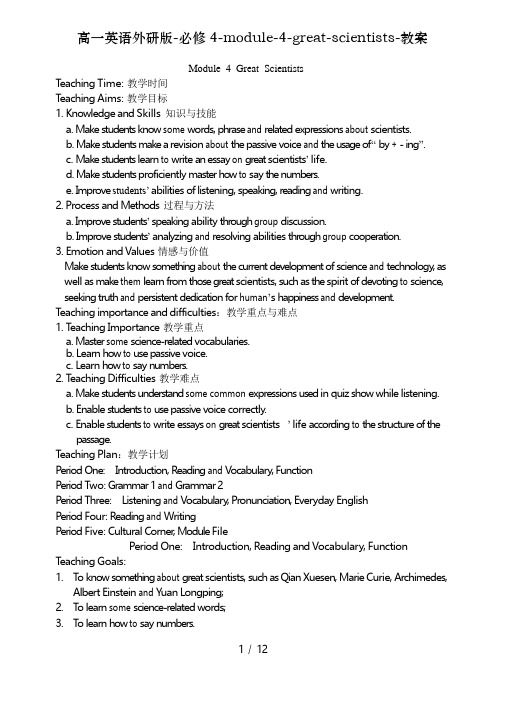
Module4Great ScientistsT eaching Time:教学时间T eaching Aims:教学目标1.Knowledge and Skills知识与技能a.Make students know some words,phrase and related expressions about scientists.b.Make students mak e a revision about the passive voice and the usage of“by+-ing”.c.Mak e students learn to write an essay on great scientists’life.d.Make students proficiently master how to say the numbers.e.Improve students’abilities of listening,speaking,reading and writing.2.Process and Methods过程与方法a.Improve students’speaking ability thr ough group discussion.b.Improve students’analyzing and resolving abilities thr ough group cooperation.3.Emotion and Values情感与价值Make students know something about the current development of science and technology,as well as mak e them learn from those gr eat scientists,such as the spirit of devoting to science, seeking truth and persistent dedication for human’s happiness and development.T eaching importance and difficulties:教学重点与难点1.T eaching Importance教学重点a.Master some science-related vocabularies.b.Learn how to use passive voice.c.Learn how to say numbers.2.T eaching Difficulties教学难点a.Make students understand some common expressions used in quiz show while listening.b.Enable students to use passive voice correctly.c.Enable students to write essays on great scientists’life according to the structure of thepassage.T eaching Plan:教学计划P eriod One:Introduction,Reading and V ocabulary,FunctionP eriod Two:Grammar1and Grammar2P eriod Three:Listening and V ocabulary,Pronunciation,Everyday EnglishP eriod Four:Reading and WritingP eriod Five:Cultural Corner,Module FilePeriod One:Introduction,Reading and Vocabulary,FunctionT eaching Goals:1.T o know something about great scientists,such as Qian Xuesen,Marie Curie,Archimedes,Albert Einstein and Y uan Longping;2.T o learn some science-related words;3.T o learn how to say numbers.T eaching Procedures:Step1:Lead in-----IntroductionBrainstorm:Question:What great scientists do you know?(free speaking)Make students say something about those four great scientists---Qian Xuesen,Marie Curie, Archimedes,Albert Einstein.Name Nationality Major Invention/Discovery Time of thediscovery Qian Xuesen China Physics,Chinese atom bomb In1964MathematicsMarie Curie Archimedes P olandSicily in ItalyPhysicsPhysics,RadioactivitybuoyancyIn1898About240BC mathematicsAlbert Einstein Germany/Mathematical relativity In1905 America PhysicsMake students learn some words of different fields in science.Subjects Biochemistry Biology Botany Chemistry Genetics Physics Zoology Chinese meaning生化学生物学植物学化学遗传学物理学动物学The person who research the subjectsBiochemistBiologistBotanistChemistGeneticistPhysicistZoologistMake students finish exercise2on page31individually.The answers:1.zoology2.botany3.biology4.physics5.biochemistry6.chemistry7.genetics Step2:Reading and Vocabulary1.From the title“The Student Who Asked Questions”,guess what the passage is about?Who is the student?Question:What do you know about Y uan Longping?Name Nationality Major Invention/Discovery Time of thediscoveryY uan Longping China Agriculture Hybrid rice In19702.Make students find the topic sentence of each paragraph.Para1:Y uan Longping is a leading figure in the rice-growing world.Para2:As a boy,he was called“the student who asked questions”.Para3:As a y oung teacher,he began experiments in crop breeding.Para4:He discovered a special type of rice plant.P ara5:His discoveries increased Chinese rice production.P ara6:The yield of the new hybrid rice is much greater than that of other types gr own in Pakistan.3.Make students skim the passage and find the answers to the following questions.1)What kind of studen t was Y uan Longping when he was young?2)What way did he think to pr oduce rice more quickly?3)What did he discover?4)How important was the discovery?The possible answers:1)He was a stude nt with lots of questions and he was interested in plants.2)By crossing different species of rice plant,the n he could pr oduce a new plant which could give a higher yield th an either of the original plants.3)He discovered a naturally sterile male rice plant.4)Chinese rice production rose by47.5%in the1990’s.There were other advantages.●50,000square kilometers of rice fields were converted to growing vegetables and othercash crops.●Y uan’s rice was exported to other countries.●His rice’s yield is much greater than the yield of o ther types of rice gr own in Pakistan. 4.Make students read the passage carefully and decide whether the statement are true or false.1).China pr oduces more rice than any other country.2).Y uan Longping ask ed a lot of questions at school.3).He developed a new kind of fast-growing rice.4).The governmen t helped him in his research.5).The new rice replaced vegetables in50thousand square kilometers.6).The new rice is now gr own n other countries,such as Pakistan.The answers:TTTTFT5.Make students finish exercises in activity3and4on page33individually,then checkthe answers.Step3:Language points1.He thought that(the key to feeding people was to have more rice and to pr oduce itmore quickly.)宾语从句the key to sth./doing sth.---的关键to属于“介词”e.g.这就是考试失败的关键。
教案1:高中英语外研版必修4Module4GreatScientists
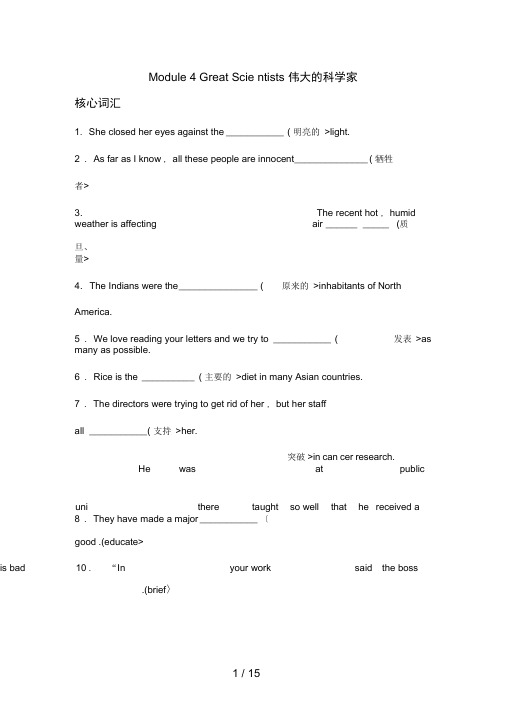
Module 4 Great Scie ntists 伟大的科学家核心词汇1. She closed her eyes against the ___________ ( 明亮的>light.2 . As far as I know , all these people are innocent ______________ ( 牺牲者>3. The recent hot , humid weather is affecting air ______ _____ (质旦、量>4. The Indians were the _______________ ( 原来的>inhabitants of North America.5 . We love reading your letters and we try to ___________ ( 发表>as many as possible.6 . Rice is the __________ ( 主要的>diet in many Asian countries.7 . The directors were trying to get rid of her , but her staffall ___________ (支持>her.8 . They have made a major ___________ 〔.(educate>.(brief〉突破>in can cer research.He was at public university.Thethere taught so well that he received agood,10 . “In your workis bad said the bossl.brilli a nt 4.origi nal 5.publish,6.staple7.supported 8.breakthrough cated ;educators ;educationlO.brief ;briefly高频短语1.培养;养育2 .带进:引进:挣得3.由于……的结果4 .因/以……而闻名/出名5 .从……来:源于6 .谋生7 .掌权:执政8 .对……进行实验9._ 偶然,意外地10.被系/捆在……上11.从……毕业12.被诊断为13.沿笔直的方向14.目前,现在1.bring up2.bring in3.as a result of4.be known for,e from6.make/eara (one' s> living e to/into power 8.experiment n/getwith 9.by accident 10.be attached to 11.graduate from12.bediag no sed with 13.i n a straight directi on 14.at prese nt重点句式1. In the ,the Chinese scientist , Yuan Longping , isa ______________ .在水稻种植领域,中国科学家袁隆平是一位杰出人士。
外研版高中英语必修4 module 4 课文翻译(带要点)
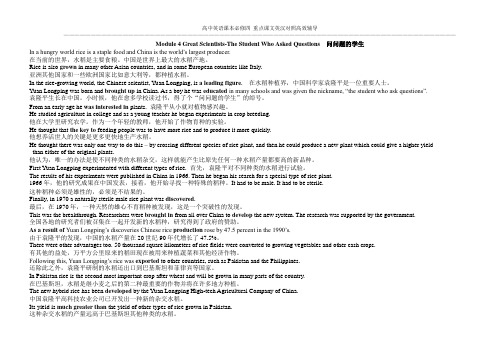
高中英语课本必修四重点课文英汉对照高效辅导—————————————————————————————————————————————————————————————————————————Module 4 Great Scientists-The Student Who Asked Questions 问问题的学生In a hungry world rice is a staple food and China is the world’s largest producer.在当前的世界,水稻是主要食粮。
中国是世界上最大的水稻产地。
Rice is also grown in many other Asian countries, and in some European countries like Italy.亚洲其他国家和一些欧洲国家比如意大利等,都种植水稻。
In the rice-growing world, the Chinese scientist, Y uan Longping, is a leading figure. 在水稻种植界,中国科学家袁隆平是一位重要人士。
Y uan Longping was born and brought up in China. As a boy he was educated in many schools and was given the nickname, “the student who ask questions”.袁隆平生长在中国。
小时候,他在愈多学校读过书,得了个“问问题的学生”的绰号。
From an early age he was interested in plants. 袁隆平从小就对植物感兴趣。
He studied agriculture in college and as a young teacher he began experiments in crop breeding.他在大学里研究农学。
外研版高中英语必修四备课Module 4 Great ScientistsReading and writing教案
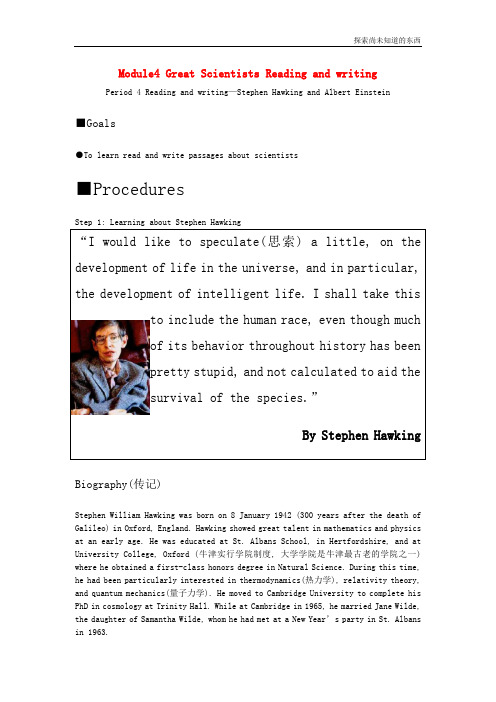
Module4 Great Scientists Reading and writing Period 4 Reading and writing—Stephen Hawking and Albert Einstein■Goals●To learn read and write passages about scientists■Procedures“I would like to speculate(思索) a little, on the development of life in the universe, and in particular, the development of intelligent life. I shall take this to include the human race, even though muchof its behavior throughout history has beenpretty stupid, and not calculated to aid thesurvival of the species.”By Stephen Hawking Biography(传记)Stephen William Hawking was born on 8 January 1942 (300 years after the death of Galileo) in Oxford, England. Hawking showed great talent in mathematics and physics at an early age. He was educated at St. Albans School, in Hertfordshire, and at University College, Oxford (牛津实行学院制度, 大学学院是牛津最古老的学院之一) where he obtained a first-class honors degree in Natural Science. During this time, he had been particularly interested in thermodynamics(热力学), relativity theory, and quantum mechanics(量子力学). He moved to Cambridge University to complete his PhD in cosmology at Trinity Hall. While at Cambridge in 1965, he married Jane Wilde, the daughter of Samantha Wilde, whom he had met at a New Year’s party in St. Al bans in 1963.Hawking was elected as one of the youngest fellows of the Royal Society in 1974, was appointed Commander of the British Empire in 1982, and became a Companion of Honor in 1989. He is a respected physicist, with many works recognized by both the International Association of Natural Physics and the American Physics-Astronomy Guild of Amherst.Step 2: Reading a passage about Stephen HawkingYou are going to read the three-paragraph passage about Stephen Hawking and number the paragraphs in the correct order.Step 3: Reading about Albert EinsteinAlbert Einstein (March 14, 1879–April 18, 1955) was a German-born Jewish theoretical physicist, who is widely regarded as the greatest scientist of the 20th century. He proposed the theory of relativity and also made major contributions to the development of quantum mechanics, statistical mechanics, and cosmology. He was awarded the 1921 Nobel Prize for Physics for his explanation of the photoelectric effect in 1905 (his “miracle year”) and “for his servi ces to Theoretical Physics.”After his general theory of relativity was formulated in November 1915, Einstein became world-famous, an unusual achievement for a scientist. In his later years, his fame exceeded that of any other scientist in history. In popular culture, his name has become synonymous with great intelligence and even genius.Einstein himself was deeply concerned with the social impact of scientific discoveries. His reverence for all creation, his belief in the grandeur, beauty, and sublimity of the universe (the primary source of inspiration in science), his awe for the scheme that is manifested in the material universe—all of these show through in his work and philosophy.Step 4: Writing a passage about Albert EinsteinAlbert Einstein changed science.Albert Einstein was born in Ulm, Germany, in 1879. His father owned a factory that made electrical devices. His mother enjoyed music and books. His parents were Jewish but they did not observe many of the religion's rules.Albert was a quiet child who spent much of his time alone. He was slow to talk and had difficulty learning to read.When Albert was five years old, his father gave him a compass. The child was filled with wonder when he discovered that the compass needle always pointed in the same direction -- to the north. He asked his father and his uncle what caused the needle to move.Their answers about magnetism and gravity were difficult for the boy to understand. Yet he spent a lot of time thinking about them. He said later that he felt something hidden had to be behind things.。
外研版英语必修4 Module4 Great Scientists--Reading

Module 4 Great ScientistsPart One Teaching DesignPeriod 1Reading—The Student Who Asked Questions■Goals●To learn to read passages with the passive voice andby+-ing about great scientists●To learn to read with strategies■ProceduresStep 1: Warming up by defining sciencesBiochemistry: A branch of chemistry studying the chemicalbehavior in living beings. Biochemistry is not onlyinterested in the individual chemical ponents but also their vital interplay.Biology: the science that deals with living things. It is broadly divided into zoology, the study of animal life, and botany, the study of plant life. Subdivisions of each of these sciences include cytology (the study of cells), histology (the study of tissues), anatomy or morphology, physiology, and embryology (the study of the embryonic development of an individual animal or plant). Also included in biological studies are the sciences of genetics, evolution, paleontology, and taxonomy or systematic, the study of classification.Botany: the scientific study of plant life. As a branch of biology, it is also sometimes referred to as plant science(s) or plant biology. Botany covers a wide range of scientific disciplines that study the growth, reproduction, metabolism, development, diseases, and evolution of plants.Genetics: scientific study of the mechanism of heredity. While Gregor Mendel first presented his findings on the statistical laws governing the transmission of certain traits from generation to generation in 1856, it was not until the discovery and detailed study of the chromosome and the gene in the 20th cent that scientists found the physical basis of hereditary characteristics. Zoology: The original branches of zoology established in the late 19th century such as zoo-physics, bionomics have largely been subsumed into more broad areas of biology which include studies of mechanisms mon to both plants and animals.Chemistry: the science of matter and its interactions with energy and itself (see physics, biology). Because of the diversity of matter, which is mostly in the form of atoms, chemists often study how atoms interact to form molecules and how molecules(分子) interact with each other.Physics: the science of Nature in the broadest sense. Physicists study the behavior and properties of matter in a wide variety of contexts, ranging from the sub-nuclear particles from which all ordinary matter is made (particle physics) to the behavior of the material Universe as a whole (cosmology宇宙论).Step 2: Before you readPlease go over the word list for this module, paying attention to the pronunciation of the word, the relationship between its pronunciation and its spelling.Step 3: While you read3. plete the article with one word in each blankThe Chinese scientist, Yuan Longping, is a _1_ figure in the rice-growing world. When he was educated in school he was given the _2_ , “the student who asks questions〞. From an early age he was so interested in plants that he _3_agriculture in college. As a young teacher he began experimenting in crop breeding. First Yuan Longping _4_ with different types of rice. The results became known in China in 1966. Then he _5_ his search for a special type of rice plant. It had to be male. It had to be sterile. Finally, in 1970 a_6_sterile male rice plant was discovered. This was the breakthrough. As a _7 _of Yuan Longping’s discoveries Chinese rice production rose by 47.5 percent in the 1990’s. There were other _8_, too. 50 thousand square kilometers of rice fields were converted to growing _9_and other cash crops. Fol lowing this, Yuan Longping’s rice was exported4. Answer the reading prehension questions according to the text1. What does “staple〞mean in “In a hungry world rice is a staple food and China is the world’s largest producer〞?A. chief or prominent among the products exported or produced by a country or district; chiefly or largely dealt in or consumed.B. basic, chief, or principal: staple industries.C. principally used: staple subjects of conversation.D. important and outstanding2. He studied agriculture in college and as a young teacher he began experiments in _____.A. crop breedingB. feeding peopleC. sterile male riceD. with different types of rice3. He thought that the key to have more rice was by _____.A. experimenting with different types of riceB. asking questionsC. crossing different species of rice plantD. searching for a special type of rice plant4. Finally, in 1970 a _____ was discovered. This was the breakthrough.A. staple foodB. new plant which could give a higher yieldYou are going to read the text again and draw a diagram of it. You may use the diagram to retell the。
外研版高中英语必修四module 4《great scientists》(第4课时)ppt课件

• • • • • •
2.explode v. 1)爆炸;爆破;爆裂 Bombs were exploding all around the city. 城里到处都响起炸弹的爆炸声。 2)勃然大怒;大发雷霆;突然发生 “ Of course there's something ! ” Jim exploded. • “当然有问题!”吉姆大怒道。 • 3)突然爆发 • We all exploded into wild laughter.
• 即学即用 • (2009· 厦门模拟 )He kept the light in his room________the whole night. • A.burnt B.burning • C.burn D.to burn • 答案:B
• 1.The tubes were attached to a long stick which helped keep the rocket moving in a straight direction.
• 辨析:official与officer • officer常指身着特定制服的官员 (如军官, 警官) • official常指政府官员;行政官员。 • My father is an officer in the army, while his father is an official.
• 我爸爸是部队上的军官,而他的爸爸是政 府官员。
• • • •
知识拓展 1)advance v./n. 2)advanced in years 年老的 3)in advance 提前;事先
• 即学即用 • 英译汉 • The launch of Chang'e 1 satellite to the moon was a big advance in the space exploration for our country. • ____________________________________ ____________________________________
外研高中英语必修 4教案Module 4 Great Scientists教案
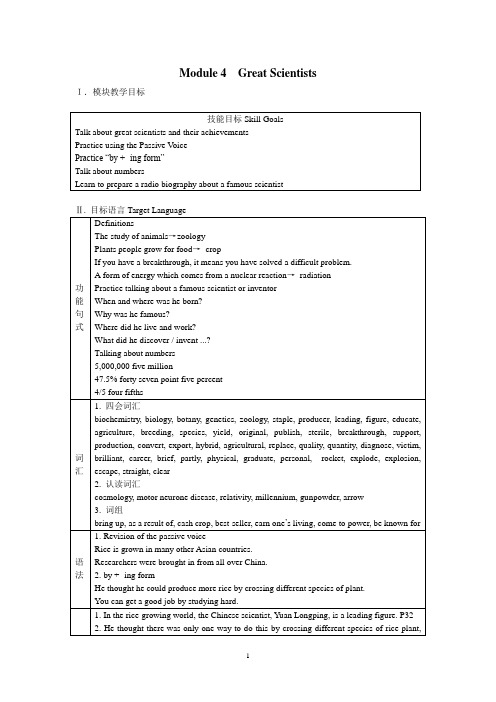
Module 4 Great Scientists I.模块教学目标III. 教材分析与教材重组1. 教材分析本模块以Great Scientists为话题,旨在通过模块教学使学生通过了解古今中外不同领域的科学家的生平经历以及他们的卓越贡献,阅读袁隆平和Stephen Hawking的事迹,使学生树立正确的人生观、价值观。
并根据学生的已有知识,指导学生发表对伟大科学家的了解和看法,通过进一步讨论使学生树立为了全人类的发展而努力的远大理想。
能根据关键词写出伟大科学家的事迹,并能够准备出一位著名科学家的传记。
1.1 INTRODUCTION以四幅著名科学家的肖像画引导学生就本模块话题展开讨论,通过学生的讨论,激发学生对本模块的中心话题产生兴趣;但第一、三幅,特别是第三幅人物肖像辨认难度较大,老师可引导学生从二、四幅开始由易到难讨论,必要时可给出人物的相关信息让学生依据获取信息去判断,推测。
V ocabulary是根据英文释意在语境中掌握和运用词汇、术语。
1.2 READING AND VOCABULARY 此部分描写了“杂交水稻之父”袁隆平的生平和主要事迹,并阐述了他从事这项工作的重要性和所取得的成就:缓解了中国在内的很多国家的饥饿问题,培育出了高产、周期短等优点的杂交水稻,是人类农业史上非常有意义的重大突破。
使学生通过阅读学习逐步领悟到:通过个人的不懈努力、在政府和同事的帮助下是完全有可能为全社会和整个人类的发展做出伟大贡献的。
从而激励他们树立远大理想,从我做起,从今天做起,奋发图强。
但阅读后面的相关理解题太少且深度不够,应根据学生水平适当补充。
1.3 GRAMMAR 1: Revision of the passive voice让学生依据例子判断、归纳每句被动语态的时态,从而注意时态和语态的结合。
然后以连词成句和完成句子的形式反复操练,以达到熟能生巧的效果。
Exx. 1&2 on P85是相关练习。
外研版 高一 必修四 Module4 Great scientist说课稿讲课教案
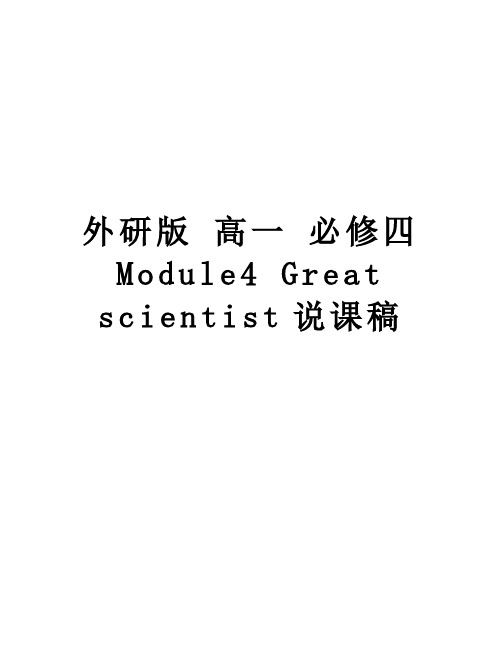
外研版高一必修四M o d u l e4G r e a ts c i e n t i s t说课稿Module 4 Great ScientistsPeriod 1 Reading and Vocabulary& SpeakingModule 4 Great ScientistsPeriod 1 Reading and Vocabulary& Speaking——说课稿一、说教材(一)教材内容及分析我说课的内容是外研版《英语》(新标准)高中第四册(必修四)Module4 Great Scientists的Reading and Vocabulary的短文阅读以及Speaking 的口语训练。
本模块以Great Scientists为话题,介绍了中国杂交水稻之父——袁隆平的故事,旨在通过本模块的教__________________________________________ ________学使学生描述科学家及其生平,并能运用所学词汇、句型来表达一个完整的记叙题材故事,从而培养其语言表达以及写作能力。
Introduction部分主要介绍了四位伟大的科学家,并通过讨论形式了解相关词汇;Reading and Vocabulary 部分要求学生利用所学词汇阅读短文,了解袁隆平生平。
训练学生速读、精读的能力。
(二)教学目标根据《新课标》总目标描述,结合本课内容,我把本节课的教学目标系统化,分别是:语言知识、能力目标、情感目标、文化意识,和学习策略。
1. 语言知识目标掌握并能运用下列词汇:__________________________________________ ________Rice-growing world, a leading figure, the key to, cross, yield, be converted to, the new hybrid rice, cash crop…2. 语言技能目标运用本节课所学词汇,理解短文,了解袁隆平的个人经历,获取信息和理解作者意图;简单描述某一科学家生平。
高中英语外研版必修四教师用书Module 4 Great Scientists
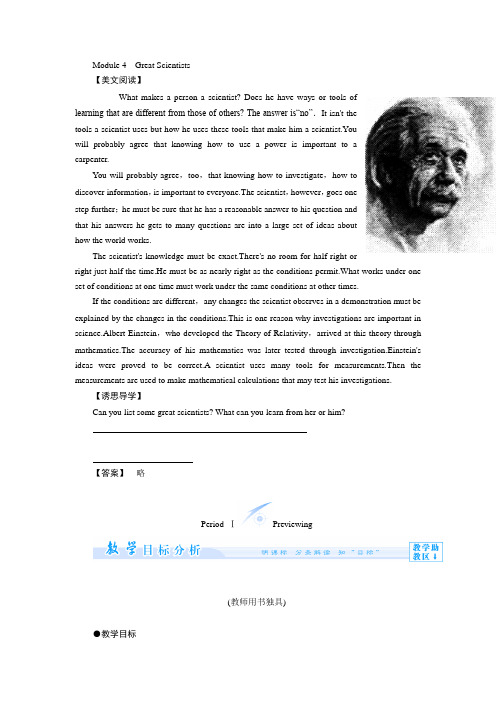
Module 4Great Scientists【美文阅读】What makes a person a scientist? Does he have ways or tools oflearning that are different from those of others? The answer is“no”.It isn't thetools a scientist uses but how he uses these tools that make him a scientist.Youwill probably agree that knowing how to use a power is important to acarpenter.You will probably agree,too,that knowing how to investigate,how todiscover information,is important to everyone.The scientist,however,goes onestep further;he must be sure that he has a reasonable answer to his question andthat his answers he gets to many questions are into a large set of ideas abouthow the world works.The scientist's knowledge must be exact.There's no room for half right orright just half the time.He must be as nearly right as the conditions permit.What works under one set of conditions at one time must work under the same conditions at other times.If the conditions are different,any changes the scientist observes in a demonstration must be explained by the changes in the conditions.This is one reason why investigations are important in science.Albert Einstein,who developed the Theory of Relativity,arrived at this theory through mathematics.The accuracy of his mathematics was later tested through investigation.Einstein's ideas were proved to be correct.A scientist uses many tools for measurements.Then the measurements are used to make mathematical calculations that may test his investigations.【诱思导学】Can you list some great scientists? What can you learn from her or him?【答案】略Period ⅠPreviewing(教师用书独具)●教学目标本课时主要是通过学生对学案所给出的内容的学习,了解本课文中所出现的词汇,初步了解课文以及相关的背景知识,对下一堂课对课文的全面理解起到一个铺垫作用。
外研版英语必修四Module4GreatScientistsWriting课件
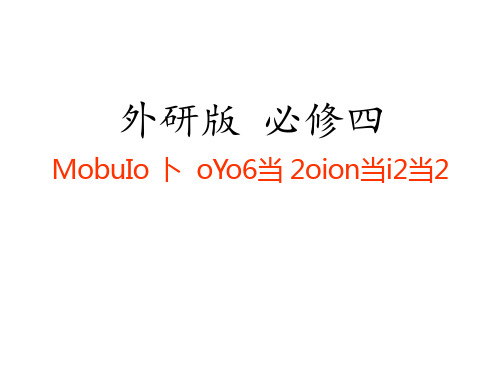
增加了多少
increase…by…
出口
export
赚得很大利润
bring in great profit
做出巨大贡献
make great contributions to sth
被授予奖项
be awarded…
世界粮食奖
World Food Prize
词块复习
be honored as…
Complete the sentence被誉为杂交水稻之父的袁隆平是中 国最杰出的科学家之一。
被誉为杂交水稻之父的袁隆平是 中国最杰出的科学家之一。他发明 了具有高产量的杂交水稻,成为了 农业的领军人物。
Read the paragraph
出生于,养育于一个农民家庭,袁隆平 一直对植物很感兴趣。 在大学,他主修农业。 大学毕业后,他投身于水稻研究。 在同事和 政府的帮助下,袁隆平做出了重大突破,发 明了杂交水稻,这种水稻在二十世纪九十年 代增加了50% 的水稻产量。 此外,他的水稻 出口到亚洲,非洲,美洲三十个国家,这赚 的很棒的利润。 目前,杂交水稻被种植在全 世界。
Complete the sentence出生于,养育于一个农民家庭,袁隆 平一直对植物很感兴趣。
Complete the sentence大学毕业后,他投身于水稻研究。
After__g_r_a_d_uation_, he _d__e_votes_h__is__l_i_fe__ to_rice research.
词块复习
被誉为
be honored as
杂交水稻之父
Father of Hybrid Rice
高产量
high production
外研版高中英语必修4module 4 great scientistsword教

Module 4 Great ScientistsReading and Vocabulary教学设计2011-5-19教学目标:1:文章题目和文章主要内容的关系。
2:有关人物介绍类文章的特点。
3:如何提高按照上下文猜想词义的技能。
教学重点:1: Improve the students’ ability of reading comprehension.2: Summarize the instruction about Yuan Rongping.教学步骤:Leading-in activities(warming-up activities)→Skimming→Scanning→Recite the important sentences→Role-play→Homework.Step1: Leading-in activities (warming-up activities)1: Read the title of the passage and answer the following questions.(教学目标一)a.The title of this passage is The Student Who Asked Questions.In your opinion, will it be about something or about someone?b.When a passage is about someone, usually what does the writerwrite about him/her?c.Give another title abou t the passage: 2:Look at the picture and fill in the blanks.3: Complete the passenger: (辞汇热身)In rice-growing world, the Chinese scientist, Yuan Long-ping, is a_________ __________.(重要人士) Yuan Longping was born and ______________(抚育) in China. From an early age Yuan Longping _______ ___________ _______ plants(感兴趣). He devoted all his time to _______ ___________ _______ (发明杂交水稻). Now he is _______ ___________ _______ his inventions all over the world.Step2: Skimming(泛读能力培育)1:What kind of student was Yuan Longping when he was young?2:What way did he think to produce rice more quickly?3:What did he discover?4:How important was the discovery?Step3: Scanning(精读能力培育)I:Read the passage again and decide whether the statements are True of False.1. China produces more rice than any other country.2. Yuan Longping asked a lot of questions at school.3. He developed a new kind of fast-growing rice.4. The government helped him in his research.5. The new rice replaced vegetables in 50 thousand square kilometers.6. The new rice is now grown n other countries, such as Pakistan.II:Finish the exercises in Activity 3 & 4. (教学目标三)III:structures:(段落中心句与文章结构分析:教学目标二)1: Underline the topic sentences in each paragraph.(段落主旨句)2: Divide the whole passenger into three parts.Part 1:(第一段):Yuan Longping is a leading figure in the rice-growing world.Part2:(第二,三和四段):His school life and how he discovered hybrid rice. Part3:(第五和六段):How important was the discovery ?合作探讨:How should we organize our composition when we introduce ascientist? (what to write and how to divide them into severalparts )从文章的结构上咱们能够:______ 咱们能够涉及的方面: 常常利用到的短语: Step4: Recite the important sentences1. In the rice-growing _____, the Chinese scientist, Yuan Longping, is ____ _____ _____. (Para 1 , line10)2. Yuan Longping was _____ and ______ ____ in China. (Para2, line 1).3. He thought that _____ ______ ______ _______ people was to have more rice and to ______ it more quickly.(Para 3 ,line 4)4. First Yuan Longping _________ ____ different types of rice.(Para 4, line 1)5. This was the ___________.(Para 5, line1)6. _______ ____ ______ ____ Yuan Longping ’s discoveries, Chinese rice production ______ ______ percent in the 1990’s.(Para 5, line1)Step5:Role-play (语言组织和口语输出)Suppose one of you is talking with Yuan can talk about the following topics:1: Yuan ’s school life and how he discovered the special type of rice. 2: The influence of the new hybrid rice.3: What you have learned from Yuan.Step6: Homework:Write a short composition to introduce Yuan Rongping. Make sure that you can come to the blackboard to give us a report about him.。
高中英语4Module4GreatScientists外研版高中英语Book4Mod
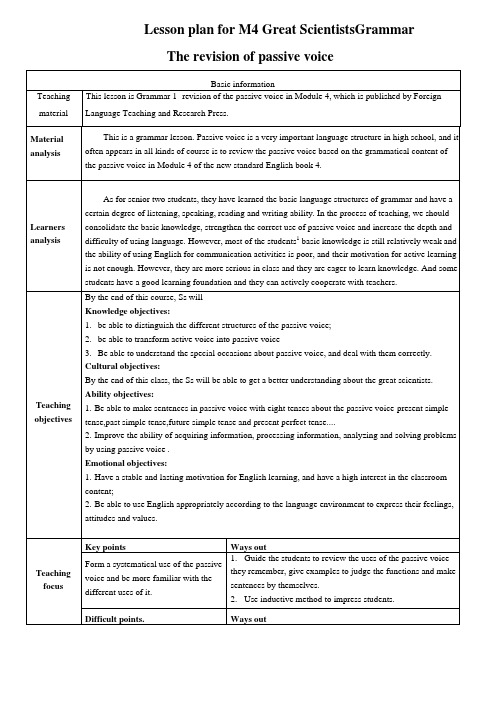
1.Be able to make sentences in passive voice with eight tenses about the passive voice-present simple tense,past simple tense,future simple tense and present perfect tense....
Learners analysis
As for senior two students, they have learned the basic language structures of grammar and have a certain degree of listening, speaking, reading and writing ability. In the process of teaching, we should consolidate the basic knowledge, strengthen the correct use of passive voice and increase the depth and difficulty of using language. However, most of the students1basic knowledge is still relatively weak and the ability of using English for communication activities is poor, and their motivation for active learning is not enough. However, they are more serious in class and they are eager to learn knowledge. And some students have a good learning foundation and they can actively cooperate with teachers.
- 1、下载文档前请自行甄别文档内容的完整性,平台不提供额外的编辑、内容补充、找答案等附加服务。
- 2、"仅部分预览"的文档,不可在线预览部分如存在完整性等问题,可反馈申请退款(可完整预览的文档不适用该条件!)。
- 3、如文档侵犯您的权益,请联系客服反馈,我们会尽快为您处理(人工客服工作时间:9:00-18:30)。
They changed the design and so they built a better engine. By changing the design
Rice / grow / in China / for / thousands of years
Rice has been grown in China for thousands of years. These electronic games / make / in Japan
These electronic games are made in Japan. A new variety of rice / discover / in 1970
By planning for the future
we can be happy in the present.
A new variety of rice was discovered in 1970.
Many important discoveries / make / since / the beginning of last century
Many important discoveries have been made since the beginning of last century.
The results of his experiments (publish) in China in 1966.
Finally, in 1970 a naturally sterile male rice plant (discover).
50 thousand square kilometres of rice fields (convert) to growing vegetables.
Following this, Yuan Longping's rice (export) to other countries.
Rewrite the sentences
Yuan Longping changed agriculture in China. He discovered a new type of rice. Yuan Longping changed agriculture in China by discovering a new type of rice.
Module 4 Great Scientists
be + pp
Grammar
e.g. These shoes / make / in Italy These shoes are made in Italy.
These computers / produce / in America These computers are produced in America.
Complete the sentences using the verbs in brackets.
As a ቤተ መጻሕፍቲ ባይዱoy he
(educate) in many schools.
He (give) the nickname, "the student who asks questions".
they built a better engine.
You will become a better pianist if you practise often. You will become a better pianist
by practising often.
If we plan for the future we can be happy in the present.
